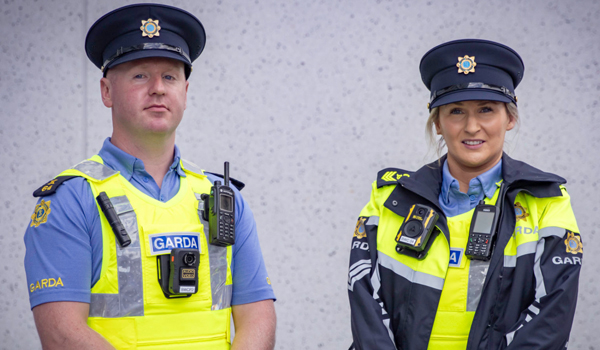An Garda Síochána tenders for BWV cameras as roll-out moves step closer
The roll-out of body-worn video (BWV) cameras by An Garda Síochána has moved a step closer with the formal publication of new tender documents.
The ‘Request for Tender’ invites companies to tender for the provision of BWV cameras and supporting digital evidence management systems (DEMS) for An Garda Síochána to conduct a Proof of Concept (PoC) for their use.
The value of the initial contacts is estimated to be in the region of 2.1 million euro.
An Garda Síochána says around 600 cameras and the associated infrastructure will initially be rolled out to a small number of garda stations to allow for an evaluation to be carried out over a 12-month period.
The equipment will initially be introduced in Dublin, Limerick and Waterford to conduct PoC pilots before more cameras are issued nationally.
An Garda Síochána says BWV cameras will be used “operationally” during thie PoC period, expected to begin in the second quarter of this year, and will be worn in accordance with a Draft Code of Practice on the use of body-worn cameras by Garda members.
The BWV camera records footage to its own internal encrypted storage, which is uploaded when the Garda docks the camera in the Garda station.
“Body-worn camera footage is uploaded at the end of a shift so it can be used as evidence at court or is deleted after an agreed time period if it’s not required as evidence,” An Garda Síochána.
It said the PoC will ultimately be replaced by a further and separate procurement process, which is designed to provide BWV cameras across the organisation to all Garda members and which will be informed by the learnings achieved from the pilot.
Based on the experiences of other police services internationally who use BWV cameras, An Garda Síochána expects that their introduction will:
- Improve safety for Gardaí;
- Reduce complaints of Garda misconduct;
- Save time in court preparation and appearances;
- Lower costs for investigations and court appearances;
- Improve ability to collect evidence for trial;
- Enhance accountability; and
- Reduce challenges around arrests.
All of the digital imagery collected by BWV cameras will be managed by a DEMS. This will enable An Garda Síochána to collect, store, manage and analyse digital evidence from camera footage.
Chief Superintendent Derek Smart said: “The publication of this Request for Tender brings An Garda Síochána a step closer to the reality of body-worn cameras being generally used by Gardaí.
“This PoC period provides an opportunity for An Garda Síochána to understand the capacity and capabilities of body-worn cameras and for the public to provide their feedback to An Garda Síochána prior to the organisation wide roll-out of body-worn cameras.
Andrew O’Sullivan, chief information officer for An Garda Síochána, added: “This is the next step in the procurement and roll-out of body-worn cameras for An Garda Síochána continuing our ongoing commitment to providing our Gardaí with the most modern electronic tools to be effective in keeping them and people safe in today’s society.
“The PoC phase is an essential element to introducing body-worn cameras, in a way which is clearly explained and understood by everybody in society, as a tool to assist members of An Garda Síochána in their day-to-day duties.”
In its report, ‘The Future of Policing in Ireland’, the Commission on the Future of Policing in Ireland CoFPI recommended that: “An Garda Síochána should develop a plan to deploy body-worn cameras. There is a significant amount of experience in other jurisdictions which could be tapped for best practice. Modern policing organisations around the world have found that body cameras can help to improve front line capability with the accurate recording of incidents, expedite analysis, enhance situational awareness, and sometimes protect police from harm.”
An Garda Síochána says the introduction of BWV cameras will be in compliance with legislation and data captured will be stored and processed in accordance with General Data Protection Regulations, Law Enforcement Directive and Data retention laws outlined in the Data Protection Act 2018.
Minister for Justice Helen McEntee said: “The government is committed to ensuring An Garda Síochána have the resources, the equipment and the technology necessary to build stronger, safer communities. This includes ensuring that Gardaí have body-worn cameras, which has been a priority of mine for some time.
“This Request for Tender for the procurement of body-worn cameras represents another important step forward in our fight against crime.
“Body cameras will be an important tool in An Garda Síochána’s armour as they fight crime, and the Recording Devices Bill, which I brought through the Houses last year, laid the groundwork for this announcement.
“Procuring cameras for these pilots now means that before the summer there will be cameras on Gardaí in Limerick and Waterford, as well as two areas of Dublin City, ahead of a nationwide roll-out.
“These trials will give Gardaí a chance to understand fully what the cameras can offer, and also allow the public to provide feedback, before we roll them out across the full organisation.
“The cameras will be small, lightweight, and visible and based on the experiences of other police services internationally, they will enhance accountability, reduce challenges around arrests and reduce complaints of Garda misconduct.”
She added: “We also expect they will save time in court preparation and appearances, lower costs for investigations and court appearances and improve An Garda Síochána’s ability to collect evidence for trial. All footage recorded by the cameras will be deleted after an agreed time period if not required as evidence.
“Most importantly, body worn cameras will better protect victims and improve safety for Gardaí.”


